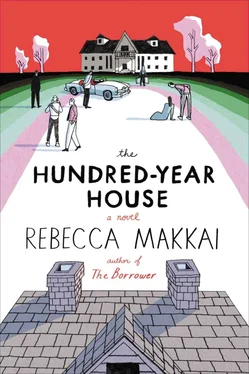“Oh, dear God, no. The colony was such a burden to my father, he’d have shredded all that. The woman who ran the place, you know, turned out to be a Communist. And the drinking! It was always in the papers, someone driving into a fence. He was glad to be rid of the whole mess.”
Zee would bawl him out when they got home. Not just for bothering her mother, but for grasping at straws. Zee so often had to defend, to people like Sid Cole, her own interest in historicity and context, that she ought to have been sympathetic to Doug’s search for something archival. But she saw no similarity.
“So that’s when you moved here?” Miriam asked. “After it closed?”
“More or less.”
There had been profound resentment in the artistic community back in the fifties, when her father reclaimed the house and moved Gracie in here with her new husband, George, Zee’s father. When Doug was engaged to Zee, he had secretly ordered a history of the Devohr family through interlibrary loan. That was the only mention of Gracie at all — the strong implication that her father closed Laurelfield just to get the drinking, womanizing George Grant out of Canada.
“So your job is to write the story of this guy’s life?” Case seemed to find this hilarious.
“It’s really an analysis of the poems. How his life affected his work.”
“Like a term paper,” Gracie offered.
“Yes,” Doug said, after he drained his glass. “Like a really long high school English paper.”
Zee, to his relief, smiled sympathetically from the other couch. She was stunning in her blue sundress, and her collarbones were a work of art.
“Refills,” Bruce announced. “Would anyone care to climb Mount Gay with me?”
Doug had been prepared for the line, was always prepared for it, but it was still a struggle not to lose it. And it was a struggle not to look at the flaming, shaking, red spot next to him that was Miriam’s face.
—
Doug stayed quiet through dinner. Sofia, the housekeeper, shuttled back and forth with plates of swordfish and asparagus, lemon sorbet, pineapple cake.
Case was telling them all a story about sailing, something about his buddy getting lost in the Gulf, when he leaned the whole chair back and hit the sideboard behind him, sending a green china vase to the floor and into a million pieces. “I’ll — oh, God, I’ll — hey, I’ll pay for that,” Case said.
“With what?” Gracie muttered.
Miriam convinced Sofia to surrender the dustpan so she could sweep the shards herself.
“He gets his coordination from me!” Bruce shouted. “That’s why they kicked him off the football team!”
Case looked like he didn’t know what to do with his hands, or how to arrange his mouth.
Doug searched for a way to change the subject, but Zee beat him to it. “You do realize that’s the ghost behind you,” she said to Miriam. “The painting, I mean.”
Bruce gave the ancestor a look most men reserved for centerfolds. “She’s a beauty, isn’t she? A natural beauty. Nothing fake back then.”
“Except the paint,” Zee said.
Doug didn’t know much about art, but he could recognize that it was a great picture. If he ran into this woman on the street in modern dress, he’d recognize her instantly. Gorgeous, it was true, by any standards. Black hair and dark eyes, like Zee, balanced by the shoulders of a black gown. But somehow profoundly evasive. Some paintings seemed to follow you with their eyes, but this one had the opposite effect: No matter where you stood, Violet woudn’t meet your gaze. He couldn’t figure out why — he just knew he didn’t want to be alone in this room at night.
“Do you mind my asking how she did it?” Miriam said. “How she died?” She was still down on the floor sweeping, a disembodied voice.
“I always imagined hanging,” Gracie said. “But my family never spoke of it.”
“Maybe that’s why I’m getting a vibe on the staircases! Maybe she did it from a railing.”
Doug hadn’t contemplated this before in detail. He’d always imagined her drinking poison quietly in bed. “She might have jumped from a window.”
“She’d make a better ghost if she wore white,” Case offered.
Miriam stood up with her dustpan and looked at the painting. “She’s got me fully convinced.”
They were all back in the solarium with coffee, windows open, hot night air rolling through. Hidalgo slept on his back. Zee wanted to be home and asleep, but she forced herself to smile at Miriam. “I’ve peeked at your new project,” she said. “I hope you’ll hang some of your pieces around the coach house.”
“Anything that doesn’t sell.”
Zee wondered if Miriam had ever sold a piece in her life. The new one was an atrocious swirl of orange with blue and brown things sticking out.
“Tell me, what inspired that orange piece?”
“Oh, it’s a fractal! It’s basically math, so don’t ask me to explain! You can just see they’re amazing, the colors and symmetry.” Zee wanted to shake her. It was her greatest fear for her female students, that they’d end up giggling and apologizing at everything.
Case grinned. “You know what I call those? The barf pictures. It’s the barf series.” He’d been drunk for a while.
“I’m starting a new bunch, though. Unloved dresses. I’m butchering them and doing tessellation around the forms. If you have any old prom dresses or anything… And I have to say, I’ve never worked better in my life than I have the past few days. This place must have a magic spring under it.”
Gracie patted her knees and sat forward. “Miriam, we’ve got the perfect little consulting job for you. There’s a painting I want to rotate out of storage, and Bruce hates it. The signature is unreadable, so we have just no idea. It’s raw, but I think it’s sweet.”
Bruce loped behind the far couch and returned with a gilt frame, the farmhouse and pasture inside all awkward angles and illogical sunlight. Like the product of an art therapy class at a nursing home. Bruce said, “We should be paying for her opinion. She’s an expert, you know.”
“We’ll pay her with old dresses!” Gracie said. “She can take Zilla’s cotillion dress. It’s still up in the closet. Remember the yellow one, with the shoulder pads? Oh, it was ghastly! I told you at the time.”
Something came to a boil inside Zee’s head, some irrational sibling rivalry she’d never had to develop skills for dealing with. She did not need a yellow silk dress from an arcane ritual she’d been forced through at age fifteen, even if Greg Stiefler had kissed her in that same dress on the lawn of the Chippeway Club. “You can’t give away my dress,” she said.
Bruce said, “I thought you were for the redistribution of goods to the proletariat!”
“Where did you get this?” Miriam asked. She rested the frame on her lap, squinting down at the corner, running a finger over the paint. She pulled her curls back.
Gracie said, “I believe it’s left from the colony. There you go, Doug! Something from the colony!”
“It could be…” Miriam said. It obviously pained her to be critical. “This person might have had some natural skill, but no training. The perspective is off.”
Case squinted over her shoulder. “Isn’t that what the modernists did?”
“Well, not like this . I’m just saying it’s not likely from the colony.”
Gracie flushed and took the painting off Miriam’s lap. “Oh, don’t worry, dear. We value your opinion. It’s funny, though. George, Zee’s father, seemed awfully fond of it. And he was an art critic! He must have seen something there. I wouldn’t know one way or the other. Sofia!” Sofia was clearing the sugar and cream. “Can you run to the northwest bedroom, the flowered one, and see if Zilla’s old yellow formal dress is still in the closet?”
Читать дальше












